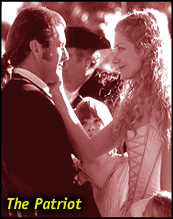![[Sidebar]](/standard/image/sidebar.gif)
July 7 - 14, 2000
![[Movie Reviews]](/standard/image/headers/movie_reviews_header.gif)
| reviews & features | by movie | by theater | film specials | hot links |
|
|
|
Battle cry
The Patriot goes to war
by Chris Fujiwara

The American Revolution has baffled filmmakers. The only Revolutionary-era movie so far to win wide approval has been John Ford's Drums Along the Mohawk. Most other efforts have been semi-remembered bombs like 1776. The makers of The Patriot apparently think they can beat the jinx by casting Mel Gibson, and I wouldn't bet against them. Gibson plays Benjamin Martin, a widowed South Carolina farmer who, conscience-stricken over his part in atrocities during the French and Indian War, now tries to keep his family out of the war for independence. But after one of his sons is killed by the evil Colonel Tavington (Jason Isaacs), Benjamin takes charge of a militia of idealistic townsfolk and scruffy backwoodsmen (plus a token Frenchman and a token slave) and leads them into battle against the British.
Martyrdom plus survival is the Gibson formula here; everything else is just garnish, including the character's psychic burden and his relationships with his children. Love, guilt, and suffering are never important to the film the way action, violence, and spectacle are. So Benjamin's initial refusal to fight makes him seem not principled but merely weak. Sensing this danger, the film wastes little time in giving him the opportunity to prove himself by kicking lots of redcoat ass.
Gibson does more acting with his face than anyone since Stan Laurel -- as if he were having a hard time believing something, or were trying to focus on something while turning away from it. For much of the movie, the filmmakers ensure that nothing else interesting happens within 500 yards of the camera, just so we'll notice the malfunctioning-machine effect of the Gibson face. It's more of a performance than the script calls for, but it's still calculated to win approval.
From time to time The Patriot provides a glimmer of entertainment. Some of the editing is sound: elaborate long shots that in other movies would be hung out to dry are clipped off before they can lose their effectiveness -- a lawn party at dusk, ships massing around the harbor. The battle scenes are so-so. While watching the film, you get an impression of riveting gore and cruelty, but in retrospect the violence seems clownish and abstract. The use of space is predictable: battle lines form, muskets crackle, then the scene breaks apart into individually wrapped bonbons of violence. The pouring-on of slow motion to let us savor the inexorability of various highlights is less interesting than the furtive injection of fast motion into Benjamin's final showdown with Colonel Tavington.
On the basis of his past record, producer/director Roland Emmerich might seem an unlikely choice for a film about the Revolutionary War. But in fact The Patriot forms, with Emmerich's two previous movies, a close-knit trilogy. The gung-ho Independence Day (whose title could hardly have been more prophetic) told us there's nothing like alien tyranny to bring out the common militarism in a diverse group of stereotypes. And Emmerich's Godzilla revealed his affinity for the theme of Frenchmen joining Americans to fight a mighty foe. Emmerich, who usually writes his own scripts, here passes the keyboard to Saving Private Ryan screenwriter Robert Rodat, who has no problem adapting to the director's pandering summer-blockbuster style. Between the two of them, they come up with the worst line ever spoken in a Revolutionary War movie: when Benjamin asks his sister-in-law (Joely Richardson) whether he can sit beside her, she replies demurely: "It's a free country. Or at least it will be soon."